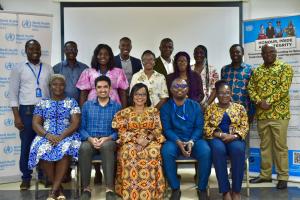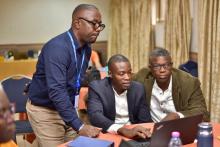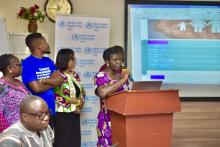WHO Supports Civil Society Organizations to Address Gender-Based Health Inequities through Monitoring of Inequalities
Accra, Ghana - Achieving Universal Health Coverage (UHC) requires addressing gender inequalities and intersecting key social determinants of health, which deeply drive poor population health outcomes. Bridging health inequality gaps, particularly those related to gender, is essential for ensuring that data is effectively used and that advocacy drives evidence-based actions. This approach is crucial in improving health outcomes for all, leaving no one behind in the pursuit of equitable healthcare.
In line with this, the World Health Organization (WHO) Ghana organized a four-day capacity-building workshop for Civil Society Organizations (CSOs) to strengthen advocacy for gender equity within Ghana’s health sector. The training falls under the Canada Global Initiative on Vaccine Equity (CanGIVE), funded by the Canadian Government. It was designed to empower CSOs on health inequality monitoring to strengthen their advocacy leadership on addressing barriers in the delivery of health and social care interventions, particularly those stemming from gender inequality and discrimination.
Addressing participants at the beginning of the training, the Officer-In-Charge of WHO Ghana, Dr Frank Lule, emphasized the vital role of CSOs in advocating for equitable health services, especially for women and girls, the underserved and marginalized communities. “By empowering CSOs with the knowledge and tools on Health Equity Assessment Toolkits to monitor and address gender-based inequities in health services, we can make significant strides toward achieving universal health coverage and equitable access to healthcare for all," he stated.
The training workshop, held in Kumasi, brought together CSOs to share experience and knowledge transfer, while enhancing their capacity to develop evidence informed advocacy products using WHO tools to drive dialogue and policy conversations on tackling gender-related barriers in health services. Participants were introduced to WHO’s compliance standards, WHO’s Health Equity Assessment Toolkits, gender, equity & human rights principles, safeguarding to prevent Sexual Exploitation, Abuse, and Harassment and knowledge production. The workshop also provided a platform for attendees to share their experiences in health advocacy and discuss their efforts to address gender barriers within their communities.
Mr. Peter Badimak Yaro, Director of Basic Needs Ghana, reflected on the significance of the training. He said, “This experience has been truly eye-opening. The monitoring exercises have helped us identify who is being left behind and why. With this knowledge, we can advocate for gender-sensitive and inclusive health policies. This tool equips us to better engage with policymakers and drive meaningful change”.
Another participant, Mrs Awurabena Guayeba Dadzie from the World Vision Ghana, echoed these sentiments, “The discussions around gender and equity have reinforced our understanding of how deeply-rooted some barriers are in our communities. We are excited to take these learnings forward and incorporate them into our ongoing health interventions”.
For Dr Charity Binka of the African Media and Malaria Research Network (AMMREN), the workshop emphasized the importance of partnerships to delivery gender responsive health systems. “One key lesson is the collective power we have to create change. We now have the knowledge and WHO tools to gather and analyze data, but it's essential to strengthen partnerships to promote gender equity and ensure healthcare services reach everyone.” she stated.
Sustained collaboration with Civil Society remains key to removing barriers that prevent equitable access to health services for all. WHO remain committed to working with and facilitating partnerships towards mainstreaming gender, equity and inclusive strategies. Together, we can ensure that everyone has access to the universal, equitable healthcare they deserve.
For Additional Information or to Request Interviews, Please contact:
Abdul-Lahie Abdul-Rahim Naa
Communications Officer
WHO Ghana Country Office
Email: abdullahiea [at] who.int (abdullahiea[at]who[dot]int)
Tel: +233 20 196 2393





